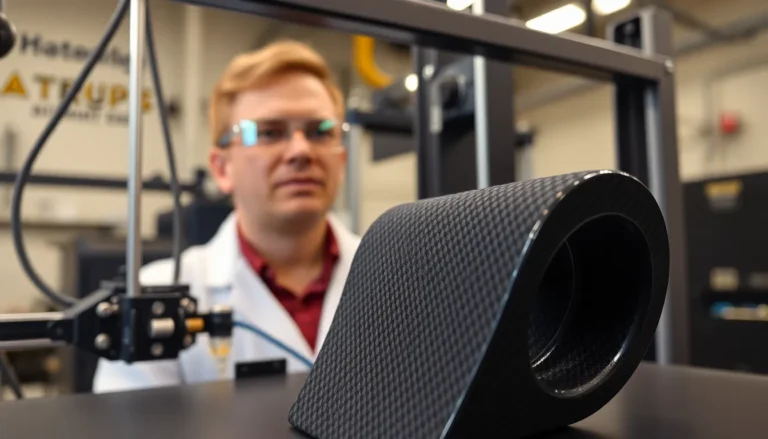Table of Contents
ToggleIn a world where tech often feels like it’s churning out more waste than a toddler with a paint set, sustainable technology companies are stepping in like eco-friendly superheroes. These innovators are on a mission to save the planet one gadget at a time, proving that you can have your smartphone and save the Earth too.
Imagine a future where your devices not only make life easier but also give Mother Nature a high-five. From renewable energy solutions to biodegradable materials, these companies are redefining what it means to be tech-savvy. They’re not just about flashy products; they’re about creating a greener tomorrow. So buckle up and get ready to explore how these trailblazers are turning the tide in the tech industry while keeping the planet’s health in check.
Overview of Sustainable Technology Companies
Sustainable technology companies focus on creating solutions that reduce environmental impact. These firms prioritize innovation and environmental responsibility in their product development. By emphasizing renewable energy sources, many organizations aim to provide alternatives to traditional technologies.
Numerous companies in this sector develop gadgets using biodegradable materials and practices. For instance, brands like Fairphone design smartphones with easily repairable components. Such designs minimize electronic waste and promote a circular economy.
Alternative energy solutions are another hallmark of sustainable tech firms. Companies like Tesla excel in advancing electric vehicle technologies, significantly reducing greenhouse gas emissions from the automotive industry. Their solar products harness sunlight, enabling homes to generate clean energy.
Data shows that sustainable technology not only benefits the planet but also improves economic viability. The global market for green technology is estimated to reach $2.5 trillion by 2025. This growth reflects increasing consumer demand for environmentally friendly products.
Collaboration among stakeholders plays a crucial role in promoting sustainable technologies. Partnerships between corporations and research institutions drive innovations that enhance energy efficiency. Furthermore, these alliances often encourage the adoption of greener practices across various industries.
Investing in these companies contributes to a sustainable future. As consumers become more conscious of their environmental footprint, their preference for eco-friendly products shapes market trends. This shift supports the development of technologies that align with ecological goals and promote sustainability.
Key Characteristics of Sustainable Technology Companies

Sustainable technology companies share distinct characteristics that set them apart in the tech landscape. They focus on eco-friendly practices and social responsibility.
Innovation and Sustainability
Innovative approaches drive sustainable technology firms. They integrate cutting-edge methods into product development. For example, companies like Fairphone emphasize modular designs. This design choice ensure simple repairs, which significantly reduces electronic waste. Furthermore, advancements in renewable energy solutions are central to their mission. These firms actively invest in solar, wind, and other green technologies. Enhancing efficiency is another priority, with many firms implementing energy-saving features in their products. This combination of innovation and sustainability paves the way for long-term environmental benefits.
Ethical Practices
Ethical practices define the operations of sustainable technology companies. They prioritize fair labor conditions and responsible sourcing of materials. Sourcing recyclable and biodegradable materials demonstrates their commitment to reducing environmental impacts. Transparency in business operations builds consumer trust and loyalty. Establishing partnerships with local communities strengthens their ethical framework. Companies like Tesla promote responsible manufacturing processes. These practices ensure a positive societal impact, aligning with consumer values in the growing market for sustainable products. Adopting these ethical standards plays a significant role in shaping company identities.
Leading Sustainable Technology Companies
Sustainable technology companies are redefining the landscape of innovation through eco-conscious products. These companies focus on minimizing their ecological footprint while enhancing consumer experiences.
Company Profiles
Fairphone stands out for its commitment to ethical electronics. It designs smartphones with modular components that are easy to repair, significantly reducing electronic waste. Tesla leads the electric vehicle market with its innovative approaches to sustainable transportation. Its electric cars and solar products aim to cut greenhouse gas emissions, setting new standards in the automotive industry. Additionally, companies like Beyond Meat revolutionize the food sector with plant-based alternatives, decreasing reliance on animal agriculture and its associated environmental impacts.
Impact on the Environment
Sustainable technology firms significantly contribute to environmental stewardship. Their innovations help lower carbon emissions and optimize resource utilization. The renewable energy sector, driven by companies like SolarCity, plays a crucial role in shifting energy consumption patterns toward cleaner alternatives. By developing biodegradable materials, these companies also address plastic pollution, promoting a circular economy. With the global market for green technology expected to reach $2.5 trillion by 2025, the focus on sustainability not only meets consumer demand but also actively supports ecological health.
Challenges Faced by Sustainable Technology Companies
Funding poses a significant challenge for sustainable technology companies. Many startups require substantial investment to develop eco-friendly products and technologies. Investors may hesitate to back these firms due to perceived risks and uncertain returns.
Regulatory hurdles often complicate operations for these businesses. Navigating complex regulations related to environmental standards can strain resources and slow down innovation. Compliance with varying regulations across regions adds another layer of difficulty.
Market competition also impacts sustainable technology companies. As the demand for green products increases, established companies often enter the market, creating a crowded landscape. Competing against larger firms with substantial marketing budgets can hinder visibility and customer acquisition.
Supply chain issues frequently arise in the pursuit of sustainable materials. Sourcing eco-friendly components may not be straightforward. Limited availability of materials can lead to increased costs and procurement delays.
Consumer awareness and education remain critical factors. Customers may lack understanding of sustainable technologies and their benefits. Increasing consumer education is essential for driving the adoption of these products.
Scalability proves challenging for many firms in this sector. Growth requires robust infrastructure and operational capacity to meet consumer demand. Small companies often struggle to scale operations while maintaining commitment to sustainability.
Technological advancements present both opportunities and challenges. Rapid changes in technology mean that sustainable companies must continually adapt to stay relevant. Balancing innovation with sustainability goals can create tension in strategic planning.
Collaboration among stakeholders can enhance outcomes but poses its own challenges. Building effective partnerships with research institutions and corporations requires time and negotiation. Coordination efforts can sometimes dilute focus on primary sustainability objectives.
Future Trends in Sustainable Technology
Innovative advancements in sustainable technology are emerging rapidly. Circular economy models gain traction as companies prioritize material reuse and recycling. Enhanced energy efficiency techniques help organizations lower operational costs while reducing environmental impacts.
Partnerships between tech companies and research institutions drive the discovery of new solutions. These collaborations play a pivotal role in developing more efficient renewable energy resources. Growth in electric vehicle adoption reflects increased consumer interest and government support for sustainable transportation options.
Data-driven insights are transforming the way companies approach sustainability. Analytics help firms identify inefficiencies in production processes and supply chains. Improved monitoring of resource utilization fosters responsible consumption and waste reduction efforts.
Artificial intelligence enhances sustainability initiatives by optimizing energy consumption patterns. It assists in predicting energy needs accurately, minimizing waste. Furthermore, advancements in biodegradable materials lead to less dependency on plastics, promoting better environmental practices.
Consumer awareness continues to shape industry demand for eco-friendly products. A growing preference for ethically sourced materials influences purchasing decisions. Enhanced transparency in corporate practices fosters loyalty among environmentally-conscious consumers.
Investment in sustainable startups is on the rise as more investors recognize the long-term potential of green technologies. This trend supports innovation aimed at addressing climate challenges effectively. Financial backing enables these firms to scale, allowing wider access to sustainable products and solutions.
Shifts toward compliance with stricter environmental regulations are also visible. Companies embracing regulatory changes often gain competitive advantages. Future trends in sustainable technology strongly signal an ongoing commitment to environmental stewardship, driven by collaboration, innovation, and ethical practices.
Sustainable technology companies are at the forefront of a transformative movement that prioritizes environmental health and innovation. Their commitment to eco-friendly practices is reshaping industries and encouraging consumers to make more responsible choices. As the market for green technology expands, these companies are not only addressing environmental challenges but also fostering a culture of sustainability.
The dedication to renewable energy solutions and ethical practices positions these firms as leaders in the quest for a greener future. By overcoming challenges and embracing collaboration, they’re paving the way for advancements that benefit both people and the planet. The future of technology is undeniably intertwined with sustainability, and these trailblazers are proving that it’s possible to innovate while caring for the Earth.




